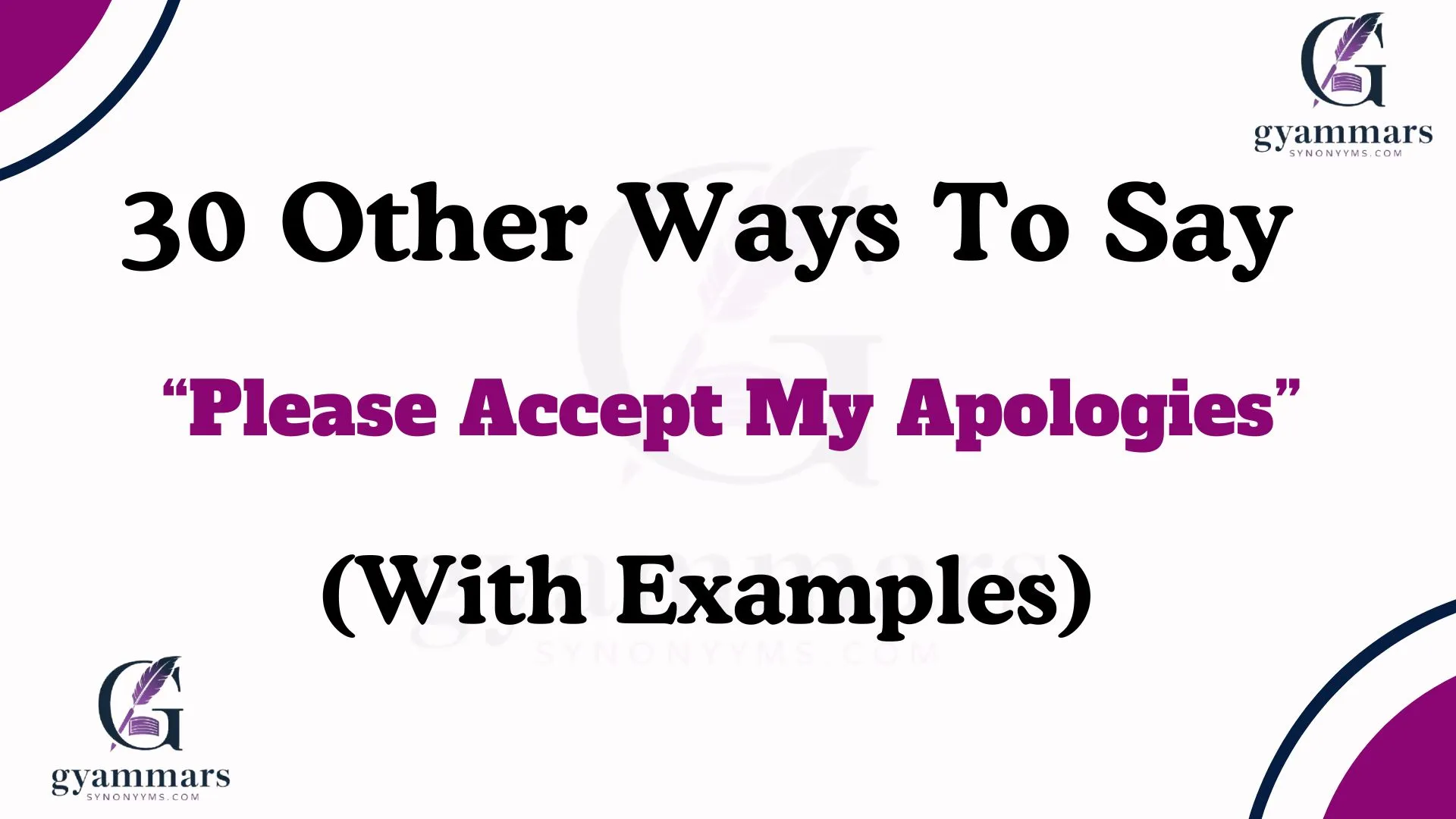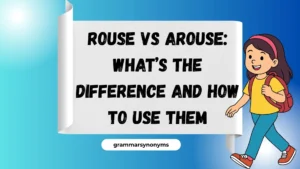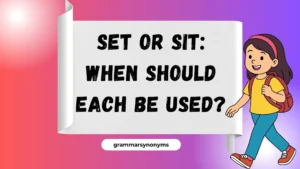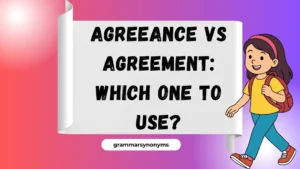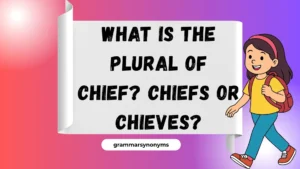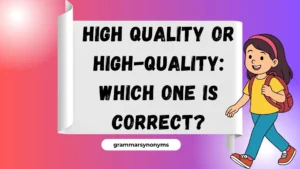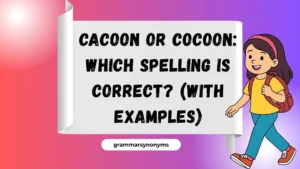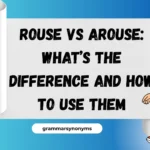Finding the right words to express genuine remorse can make all the difference in repairing relationships and ensuring your message is well-received. Saying “Please accept my apologies” is a polite and professional way to express regret, but sometimes, a more personal, heartfelt, or casual phrase may be more suitable.
Whether you’re apologizing in a formal setting, a casual conversation, or a deeply personal situation, having alternative phrases can help you communicate with warmth and sincerity. Here are 30 other ways to say it, along with examples and guidance on when to use each.
What Does “Please Accept My Apologies” Mean?
The phrase “Please accept my apologies” is a polite, formal, and respectful way to express regret. It acknowledges a mistake or misstep and requests the other person’s understanding and forgiveness.
It is commonly used in professional emails, formal letters, and situations where you need to sound sincere yet composed.
Is It Professional/Polite to Say “Please Accept My Apologies”?
Yes, “Please accept my apologies” is considered both professional and polite. It is commonly used in business settings, official statements, and customer service communications.
However, in casual settings, it may come across as too formal or distant. In such cases, a more conversational or personal phrase may be better suited.
Pros and Cons of Saying “Please Accept My Apologies”
Pros:
- Professional and respectful
- Widely understood and accepted
- Appropriate for formal emails, workplace communication, and public apologies
- Maintains composure in delicate situations
Cons:
- Can feel distant or impersonal in close relationships
- Lacks emotional warmth in heartfelt situations
- Not always suitable for casual conversations
Synonyms For “Please Accept My Apologies”
- I sincerely apologize
- I’m truly sorry
- I deeply regret this
- My sincerest apologies
- I apologize for the inconvenience
- I owe you an apology
- Please forgive me
- I take full responsibility
- I hope you can forgive me
- I’m really sorry about this
- I regret my actions
- I didn’t mean to hurt you
- I feel terrible about this
- I can’t tell you how sorry I am
- I truly regret what happened
- I take full accountability
- I wish I could take it back
- That was wrong of me
- I shouldn’t have done that
- I was out of line
- I know I messed up
- I made a mistake, and I’m sorry
- I misjudged the situation
- I feel awful about this
- It was never my intention to hurt you
- I regret my words/actions
- I acknowledge my mistake
- I want to make things right
- That was my fault, and I apologize
- I am ashamed of my actions
1. I Sincerely Apologize
Definition: A formal way to express deep regret with sincerity.
Detailed Explanation: This phrase adds emphasis with “sincerely,” making it more heartfelt than a simple apology.
Scenario Example:
“I sincerely apologize for the oversight in my report. I will correct it immediately.”
Best Use: Professional and personal settings where sincerity is key.
Tone: Formal, respectful, and remorseful.
Additional Notes: Works well in emails, business apologies, and customer service interactions.
2. I’m Truly Sorry
Definition: A slightly more personal way to express genuine regret.
Detailed Explanation: Saying “truly” adds weight to your apology, making it feel authentic and heartfelt.
Scenario Example:
“I’m truly sorry for missing your birthday. I’ll make it up to you!”
Best Use: Personal and semi-formal settings.
Tone: Warm, sincere, and slightly casual.
Additional Notes: Suitable for friends, colleagues, and light professional situations.
3. I Deeply Regret This
Definition: A strong expression of remorse.
Detailed Explanation: This phrase conveys a high level of regret and is best used when acknowledging a serious mistake.
Scenario Example:
“I deeply regret my actions and the hurt they caused you.”
Best Use: Serious personal and professional apologies.
Tone: Formal, heavy, and remorseful.
Additional Notes: Best used when accepting full responsibility.
4. My Sincerest Apologies
Definition: A formal and deeply respectful way to apologize.
Detailed Explanation: This phrase is slightly more elegant and polished than simply saying “I apologize.” It works well in both professional and personal settings.
Scenario Example:
“My sincerest apologies for the mix-up in your order. We will send a replacement right away.”
Best Use: Formal letters, professional emails, and public statements.
Tone: Polite, respectful, and refined.
Additional Notes: This phrase is great for written apologies in corporate or diplomatic settings.
5. I Apologize for the Inconvenience
Definition: A professional and neutral way to acknowledge an issue.
Detailed Explanation: This phrase is commonly used in customer service or business communication when addressing minor mistakes or delays.
Scenario Example:
“I apologize for the inconvenience. Our team is working on resolving the issue as quickly as possible.”
Best Use: Customer service, corporate communication, and minor inconveniences.
Tone: Professional, neutral, and accommodating.
Additional Notes: Best used in service-related industries where you want to acknowledge the issue without sounding overly apologetic.
6. I Owe You an Apology
Definition: A personal and direct way to take responsibility.
Detailed Explanation: This phrase acknowledges that an apology is necessary, making it feel genuine and responsible.
Scenario Example:
“I owe you an apology for my behavior last night. I wasn’t being fair to you.”
Best Use: Personal relationships and informal settings.
Tone: Honest, direct, and remorseful.
Additional Notes: It sets the stage for a meaningful conversation where you can explain yourself further.
7. Please Forgive Me
Definition: A heartfelt plea for forgiveness.
Detailed Explanation: This phrase directly asks the other person to let go of any resentment and move forward.
Scenario Example:
“Please forgive me for missing your big day. I feel terrible about it.”
Best Use: Close relationships where deep emotions are involved.
Tone: Emotional, sincere, and humble.
Additional Notes: Best used when you truly need forgiveness and want to show vulnerability.
8. I Take Full Responsibility
Definition: A strong statement showing accountability.
Detailed Explanation: This phrase emphasizes that you are not making excuses and are fully owning up to your actions.
Scenario Example:
“I take full responsibility for what happened. It was my mistake, and I will do my best to make it right.”
Best Use: Professional settings, leadership roles, and serious personal mistakes.
Tone: Strong, accountable, and mature.
Additional Notes: This is a powerful phrase to use when rebuilding trust.
9. I Hope You Can Forgive Me
Definition: A polite and gentle way to seek forgiveness.
Detailed Explanation: This phrase acknowledges the hurt you may have caused while also leaving space for the other person to decide how they feel.
Scenario Example:
“I hope you can forgive me for being so insensitive earlier. That wasn’t my intention.”
Best Use: Personal relationships and emotionally sensitive situations.
Tone: Gentle, remorseful, and hopeful.
Additional Notes: Best when you’re not sure if the person is ready to forgive.
10. I’m Really Sorry About This
Definition: A casual and straightforward apology.
Detailed Explanation: This phrase works well when you want to express regret without sounding too formal.
Scenario Example:
“I’m really sorry about this, I should have double-checked before sending the message.”
Best Use: Everyday situations and informal conversations.
Tone: Casual, warm, and sincere.
Additional Notes: It’s versatile and can be used in both professional and casual settings.
11. I Regret My Actions
Definition: A straightforward way to express remorse over something you did.
Detailed Explanation: This phrase is direct and reflective, showing that you acknowledge your mistake and regret your behavior.
Scenario Example:
“I regret my actions yesterday. I wasn’t thinking clearly, and I realize now that I hurt you.”
Best Use: When taking responsibility for a past mistake.
Tone: Serious, honest, and remorseful.
Additional Notes: This phrase works best in personal situations where you need to express deep regret.
12. I Didn’t Mean to Hurt You
Definition: A compassionate way to clarify that your actions were unintentional.
Detailed Explanation: This phrase helps soften the impact of a mistake by reassuring the other person that you didn’t act with bad intentions.
Scenario Example:
“I didn’t mean to hurt you. I was frustrated, but I see now that my words were too harsh.”
Best Use: When emotions are involved and you want to reassure someone.
Tone: Caring, apologetic, and gentle.
Additional Notes: This phrase works best when clarifying intentions in friendships, family relationships, and romantic partnerships.
13. I Feel Terrible About This
Definition: A strong expression of guilt and regret.
Detailed Explanation: This phrase makes it clear that you deeply regret what happened and feel awful about the impact it had.
Scenario Example:
“I feel terrible about this. I should have been there for you when you needed me.”
Best Use: When you want to emphasize your remorse and show deep regret.
Tone: Emotional, regretful, and sincere.
Additional Notes: Works well in personal apologies where you want to highlight the depth of your feelings.
14. I Can’t Tell You How Sorry I Am
Definition: A heartfelt and exaggerated way of expressing deep regret.
Detailed Explanation: This phrase makes the apology feel stronger and more sincere, emphasizing that words alone can’t express how bad you feel.
Scenario Example:
“I can’t tell you how sorry I am for forgetting your birthday. You mean so much to me.”
Best Use: When you want to apologize deeply and emotionally.
Tone: Dramatic, sincere, and heartfelt.
Additional Notes: Best for close relationships where you want to show how much you truly care.
15. I Truly Regret What Happened
Definition: A formal and genuine way to express regret.
Detailed Explanation: This phrase works well when you want to sound thoughtful and accountable while keeping a professional tone.
Scenario Example:
“I truly regret what happened during the meeting. I should have handled things differently.”
Best Use: Professional settings, formal apologies, and serious mistakes.
Tone: Formal, responsible, and sincere.
Additional Notes: Works well in both personal and business situations where you need to show accountability.
16. I Take Full Accountability
Definition: A strong way to acknowledge your mistake and take responsibility.
Detailed Explanation: This phrase shows that you are owning up to your actions without excuses.
Scenario Example:
“I take full accountability for the miscommunication. It was my responsibility to clarify the details.”
Best Use: Workplace apologies, leadership roles, and formal settings.
Tone: Professional, serious, and responsible.
Additional Notes: This phrase is especially useful in business and leadership settings.
17. I Wish I Could Take It Back
Definition: Expressing regret and a desire to undo the mistake.
Detailed Explanation: This phrase shows deep remorse by acknowledging that you wish the situation had never happened.
Scenario Example:
“I wish I could take it back. I never meant to say something so hurtful.”
Best Use: When you’ve said or done something irreversible but want to show genuine regret.
Tone: Sincere, emotional, and regretful.
Additional Notes: Works best in personal conversations where you want to emphasize deep sorrow.
18. That Was Wrong of Me
Definition: A direct way to admit fault and take responsibility.
Detailed Explanation: This phrase makes it clear that you recognize your mistake and are willing to own up to it.
Scenario Example:
“That was wrong of me to interrupt you like that. I should have let you finish speaking.”
Best Use: When you need to acknowledge poor behavior or a moral mistake.
Tone: Serious, accountable, and direct.
Additional Notes: This phrase is useful in both professional and personal situations.
19. I Shouldn’t Have Done That
Definition: A simple but powerful way to admit wrongdoing.
Detailed Explanation: This phrase is straightforward and makes it clear that you regret your actions without making excuses.
Scenario Example:
“I shouldn’t have done that. I realize now that it was inconsiderate.”
Best Use: When admitting to a mistake and showing remorse.
Tone: Humble, honest, and regretful.
Additional Notes: Best for casual and serious apologies alike.
20. I Was Out of Line
Definition: A way to admit that your behavior was inappropriate.
Detailed Explanation: This phrase acknowledges that you crossed a boundary or acted in a way that wasn’t acceptable.
Scenario Example:
“I was out of line for speaking to you that way. I truly apologize.”
Best Use: When apologizing for disrespectful or inappropriate behavior.
Tone: Formal, serious, and responsible.
Additional Notes: Often used in professional or formal settings.
21. I Know I Messed Up
Definition: A casual and personal way to take responsibility.
Detailed Explanation: This phrase makes your apology feel natural and relatable, showing that you fully accept your mistake.
Scenario Example:
“I know I messed up, and I’ll do whatever it takes to make things right.”
Best Use: When apologizing to friends, family, or colleagues in a casual setting.
Tone: Humble, informal, and honest.
Additional Notes: Best for close relationships where a more relaxed tone is appropriate.
22. I Made a Mistake, and I’m Sorry
Definition: A direct way to acknowledge an error and apologize.
Detailed Explanation: This phrase keeps the apology simple and to the point, ensuring clarity.
Scenario Example:
“I made a mistake, and I’m sorry for the trouble it caused.”
Best Use: When you want to apologize sincerely without overcomplicating things.
Tone: Honest, direct, and professional.
Additional Notes: Works in both personal and business settings.
23. I Misjudged the Situation
Definition: An apology for making the wrong assumption.
Detailed Explanation: This phrase admits a misunderstanding and acknowledges that you were wrong in your assessment.
Scenario Example:
“I misjudged the situation, and I now see where I went wrong.”
Best Use: When you’ve made an incorrect assumption or decision.
Tone: Thoughtful, responsible, and professional.
Additional Notes: Ideal for workplace and social settings.
24. I Feel Awful About This
Definition: A way to express deep regret and emotional distress.
Detailed Explanation: This phrase makes it clear that you’re upset about your actions and how they affected the other person.
Scenario Example:
“I feel awful about this. I never wanted to disappoint you.”
Best Use: When apologizing for emotional harm or disappointment.
Tone: Emotional, regretful, and compassionate.
Additional Notes: Best used in personal conversations.
25. It Was Never My Intention to Hurt You
Definition: A phrase that clarifies your intentions while still apologizing.
Detailed Explanation: This phrase helps soften the impact of a mistake while showing that you care.
Scenario Example:
“It was never my intention to hurt you. I truly regret my words.”
Best Use: When you need to clarify that your actions weren’t meant to be harmful.
Tone: Gentle, compassionate, and remorseful.
Additional Notes: Best for personal relationships.
26. I Regret My Words/Actions
Definition: A formal and direct way to express regret.
Detailed Explanation: This phrase is versatile and can be used to apologize for both words and actions.
Scenario Example:
“I regret my words. I should have chosen them more carefully.”
Best Use: When apologizing in both professional and personal situations.
Tone: Formal, sincere, and thoughtful.
Additional Notes: Useful in corporate and academic environments.
27. I Acknowledge My Mistake
Definition: A professional and responsible way to apologize.
Detailed Explanation: This phrase shows maturity and accountability, making it great for formal situations.
Scenario Example:
“I acknowledge my mistake and will take steps to ensure it doesn’t happen again.”
Best Use: When apologizing in a business or leadership role.
Tone: Professional, serious, and responsible.
Additional Notes: Best for workplace and professional apologies.
28. I Want to Make Things Right
Definition: A phrase that emphasizes a desire to correct your mistake.
Detailed Explanation: This phrase makes the apology proactive, showing that you’re willing to fix the situation.
Scenario Example:
“I want to make things right. Let me know what I can do.”
Best Use: When you’re looking to repair a relationship or problem.
Tone: Hopeful, proactive, and sincere.
Additional Notes: Works best for personal and business relationships.
29. That Was My Fault, and I Apologize
Definition: A strong way to take full responsibility.
Detailed Explanation: This phrase makes it clear that you recognize the mistake and take ownership.
Scenario Example:
“That was my fault, and I apologize for the confusion.”
Best Use: When you want to be direct and accountable.
Tone: Professional, serious, and responsible.
30. I Am Ashamed of My Actions
Definition: A deep and emotional apology for serious mistakes.
Detailed Explanation: This phrase conveys deep remorse and self-reflection.
Scenario Example:
“I am ashamed of my actions. I will work hard to regain your trust.”
Best Use: When making amends for a serious error.
Tone: Deeply remorseful, serious, and emotional.
FAQs
1. Why is it important to have different ways to say “Please Accept My Apologies”?
Using varied phrases makes your apology feel genuine, thoughtful, and personal. Repeating the same generic apology can feel insincere, while a well-chosen phrase can better match the situation and your emotions.
2. Which alternative is the most professional?
For a formal or workplace apology, use phrases like:
- “I take full responsibility and sincerely apologize.”
- “I acknowledge my mistake and will correct it moving forward.”
- “That was my fault, and I deeply regret the oversight.”
These keep the apology direct, professional, and accountable.
3. What’s the best way to apologize to a friend?
For friends, a casual and heartfelt approach works best:
- “I messed up, and I feel awful about it.”
- “I wish I could take it back. You mean a lot to me.”
- “I never meant to hurt you, and I hope you can forgive me.”
These phrases show care and sincerity without sounding too formal.
4. How do I apologize without over-apologizing?
Apologizing too much can weaken your message. Instead of repeating “I’m sorry” excessively, try:
- Acknowledge the mistake: “I take responsibility for what happened.”
- Express regret: “I truly regret my actions.”
- Offer a solution: “I want to make this right. Let me know how I can help.”
This keeps your apology strong and effective.
5. When should I apologize formally vs. informally?
- Formal Apologies: Use in work, business, or professional settings (e.g., bosses, clients, colleagues).
- Informal Apologies: Use with friends, family, or casual settings where a personal touch is better.
Conclusion
Apologizing is more than just saying “Please accept my apologies”—it’s about conveying genuine regret, accountability, and a desire to make things right. The words you choose can shape the impact of your message, making it feel more personal, thoughtful, and meaningful to the person receiving it.
Whether you’re apologizing in a professional setting, to a friend, or to a loved one, choosing the right phrase ensures that your message comes across sincerely. Some situations call for formal and direct wording, while others need a warm, heartfelt approach.
By using the 30 alternatives provided, you can tailor your apology to fit the tone, relationship, and severity of the situation. Remember, the most important part of any apology is not just the words you say, but the actions you take to show you truly mean it.
At the end of the day, a genuine apology—spoken or written—can mend relationships, restore trust, and help move forward with understanding and care. 💙

“Emma Rose at Grammar Synonyms is your go-to expert for everything related to language and expression. Whether you’re refining your grammar, searching for the perfect synonym, or looking for creative ways to improve your writing, Emma Rose provides the tools and inspiration you need. With a wide range of resources designed to elevate your communication, Grammar Synonyms helps you find just the right words to make every sentence shine.
